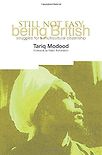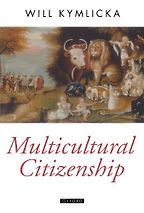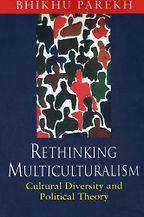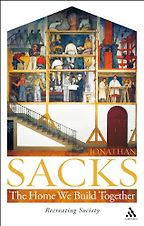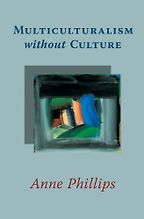The first of the books you’ve chosen on multiculturalism is Multicultural Citizenship by the Canadian political philosopher Will Kymlicka. What does he mean by this?
Well, I think the first thing to say about the book is that multiculturalism as a political theory began in the late 1980s and we are actually indebted to Canadian theorists. Canada was the first country to declare itself a multicultural state and Will Kymlicka, with this book in particular, is really pioneering this theory. This is one of the first major statements of a political theory of multiculturalism and Will Kymlicka is really the leading liberal exponent of multiculturalism; meaning that he thinks individual freedom is the highest good. For him multicultural citizenship is about extending our politics to accommodate minority groups. But he says the reason we should do this is because individuals will lead more fulfilling lives. They will be more themselves if we do this. So unlike others he actually says the highest good is not accommodating groups but allowing individuals the maximum amount of freedom and opportunity to develop themselves.
He has some good example of this, hasn’t he? One is where he talks about Orthodox Jews in the US who want an exemption from military dress codes so they can wear their yarmulkes and they want this exemption so they can then join in.
Yes, exactly so. His example is that we offer these exemptions so that people are able to be fully citizens. It is a form of integration which will come as a surprise to some people, because some people think multiculturalism is the enemy of integration. I think what a lot of people mean by integration is actually what I think of as assimilation because they think it means you should be like the majority of the population.
“Liberalism is all about the rights of individuals and multiculturalism balances the rights of individuals with the right of people to belong to cultures which may be minority cultures”
One other thing about the book is that he combines in his multicultural citizenship three different groups of people from Canada. These are indigenous people – for example, the Inuits as well as the Native Americans; he is thinking of national or sub-national groups like the French speakers of Quebec, and he is thinking about migrant groups, but he gives the migrant groups the least political status. So you asked me what does he mean by multicultural citizenship and I think in some ways the book would have been better titled ‘Multinational Citizenship’ because the political status that he gives to Native Americans and the Québécois, who he conceives of as nations, is quite considerable compared to the opportunities for accommodation given to the immigrants.
Next on your list of books is Bhikhu Parekh’s Rethinking Multiculturalism: Cultural Diversity and Political Theory.
Bhikhu Parekh is really the leading British theorist of multiculturalism and he combines extensive public service with political philosophy. For instance, he was the acting chair of the Commission for Racial Equality in the early 1990s and at the end of the 1990s he chaired the Commission on the Future of Multi-Ethnic Britain. He published a string of essays on multiculturalism in the 80s and 90s. Then he produced this book which came out in the year 2000 and is a very substantial statement of multiculturalism. Unlike Will Kymlicka, he wants to go beyond liberalism; he wants to argue that we should include groups, and not just because ultimately individual freedom is so important, and that somehow groups contribute to individual freedom. He thinks that both people and groups are important, so he is talking about people whose fulfilment lies in membership of a certain group. He says we shouldn’t have to find reasons for including groups based on what one might call liberal or individualist arguments.
Get the weekly Five Books newsletter
Though, of course, one consequence of this is the tension between individual rights and what one might call group rights. So if we say individuals should be able to run their own community affairs, well, there are some groups, say, South Asian origin groups, who are likely to run their affairs by appointing elderly males as community leaders, and we might say, what about your women? And they could say that their role is something else. But some women within that group might feel that their rights are being less respected than the rights of their male community members.
There are other difficult cases, like female circumcision, where individual rights and allowing cultures to continue with their customs and practices conflict. But Bhikhu Parekh discusses in great detail the controversial cases like this and shows how it is possible, through an effort by each side to understand the other, to find some sort of accommodation. He does want to support individual rights but he thinks that sometimes individual rights can be interpreted in very Western ways, which deny other cultures certain opportunities to promote their own ways of living.
Next of the books on multiculturalism you’ve picked is Jonathan Sacks’s The Home We Build Together: Recreating Society.
The last three books are all a little bit later than the first books. So for instance the next two books are published in 2007 and my book was published in September 2010. That means that they are shaped by a climate in which multiculturalism has become unpopular. The first two books are to some extent manifestos for what is seen as a new approach to politics, whereas the next three books are all considerably more defensive and more qualified about what multiculturalism means and how much it is being advocated.
Jonathan Sacks’s book falls into that category because it is notable that in his earlier books he was a champion of strong communities and diversity, of groups having the space to be different so they could be faithful to their own traditions. But in this new book he emphasises what he calls integrated diversity. Now, actually, a lot of what he says about this is shared by people like myself who call ourselves multiculturalists. And Jonathan Sacks only manages to distinguish his own position from a multiculturalist position by caricaturing multiculturalism. I would say that although the book has many strengths, one of its weaknesses is that it doesn’t engage with multiculturalist authors – it just uses multiculturalism to refer to something negative.
Five Books interviews are expensive to produce. If you're enjoying this interview, please support us by donating a small amount.
But nevertheless, I think he has a vision of politics that is definitely helpful because he wants to show how strong communities are important – in fact he is almost like David Cameron’s Big Society in this respect – but we have to share a common set of political values which he refers to using a religious vocabulary. There has to be a covenant amongst us and a covenant is something more than a contract. With a contract you do a private deal but you don’t have to share anything in common, whereas citizens who live together under a covenant agree to live in accordance with certain political values. The political values he has in mind are those of liberal democracy. That is a slightly different position to the mainstream multiculturalists, because although multiculturalists have to take notice of values, they don’t emphasise in quite such a strict way the common values of society. For me, the problem with this book is that it seems to make enemies of multiculturalists for what I would say are political purposes, namely trying to be a bit more popular at a time when multiculturalism is unpopular.
And have you put these points to him?
Yes, I have written to him three times but had no response either from him or in the form of his published work. Perhaps if he reads this he will be provoked into a response!
Your next book, Multiculturalism Without Culture, is by the feminist Anne Phillips.
Anne Phillips is a professor at the London School of Economics and gender is given a prominence in this book which is not found in the other books. Actually, when you think about it, many of the specific controversies in relation to multiculturalism involve women and arguments about gender. These are things like the burqa, female circumcision, polygamy, the age of consent and arranged marriages. So it is not in any way surprising that someone coming from a feminist point of view can find a lot to engage with positively and negatively on the multiculturalist front. Some feminists have been critical of multiculturalism because they say that it leads to selling short women’s rights.
What is good about this book is that Anne Phillips is a feminist who believes that her position is compatible with multiculturalism and she offers a defence of multiculturalism in her book. She thinks that it is possible to find a path through the kind of controversies I have mentioned, which is respectful of women’s rights on the one hand and of cultural difference on the other – hence, the title of her book.
“When you think about it, many of the specific controversies in relation to multiculturalism involve women and arguments about gender”
The title of the book itself is intriguing. I would say that one of the critiques beside the gender dimension that people have made of multiculturalism is that people say it talks about groups and culture in some kind of holistic way. But actually these groups don’t exist, this culture doesn’t exist. Culture with a capital ‘C’. We all have all kinds of bits and pieces borrowed and put together from lots of different sources. There is no such thing as the Indian culture, the British culture, the Black culture or whatever. We are a fluid and ongoing mix. What Anne has done in this book is to offer a defence of multiculturalism that works with this argument. She wants to ditch the idea that there are single unified cultures that we can talk of as British culture etc.
Do you agree with her?
I agree with many of her positions in the book and I have learnt from them but I don’t accept that we can completely give up the idea of groups or culture, and Anne and I have debated this in print and we don’t agree. I think that one of the key differences between multiculturalism and liberalism is that liberalism is all about the rights of individuals and multiculturalism balances the rights of individuals with the right of people to belong to cultures which may be minority cultures and so on. So we have to have some idea of what it is to belong to a group. Therefore we need some idea of a group even if it is a very watered down one, which is what I favour myself.
Tell me about your final choice: this is your own book, Still Not Easy Being British: Struggles for a Multicultural Citizenship.
Well, again, my book is coming at a time when a lot of people think that multiculturalism is dead or should be dead. And so it tries to show that many of our controversies today are crying out for multicultural solutions. I would say that the distinctive features of my book compared to the others in this collection are that it includes shorter pieces aimed at non-academics and that it focuses on Muslims.
Most people think that the problems related to multiculturalism are all to do with Muslim identity politics and Muslim demands on British society or other similar societies. In my book I also emphasise national identity or Britishness, which on the whole multiculturalists tend not to because they are anxious that national identity will be taken in a kind of imposed, domineering way, that minorities will be, as it were, ticked off for not being sufficiently British.
I argue that the way that we come to see why Britishness is important is actually not so very different to how we see multiculturalism as important, because we see how these identities, whether they be minority Pakistani identity in Britain or whether it is being British – and many minorities want to be British; it is not something that is imposed on them – we see that these identities are important to people. So we have to find a way in politics of including rather than of trying to exclude them.
But many people would argue that we do that already. Britain is frequently cited as being one of the most inclusive countries in the world.
Well, I do, too. I think on the whole we do have a sense of inclusion in this country in our idea of what a citizen is. And that is why Britishness and multiculturalism are compatible. But, of course, it is not a static situation, so all the time we should contest those whose features of Britishness seem to be exclusive, such as a past sense of being British, or the idea that we are only a Christian or only a secular country. Some critics would say that the problem is that Muslims don’t fit in with our secular policies, and I address that in the book and argue that actually Britain may be a secular country but the ways in which we are secular are ways inclusive of religious people.
We find space for organised religion in our public affairs. I would say that what I offer in the book is a version of multiculturalism which is compatible with and based on liberal citizenship, moderate secularism and inclusive Britishness.
December 1, 2010. Updated: January 19, 2023
Five Books aims to keep its book recommendations and interviews up to date. If you are the interviewee and would like to update your choice of books (or even just what you say about them) please email us at [email protected]

